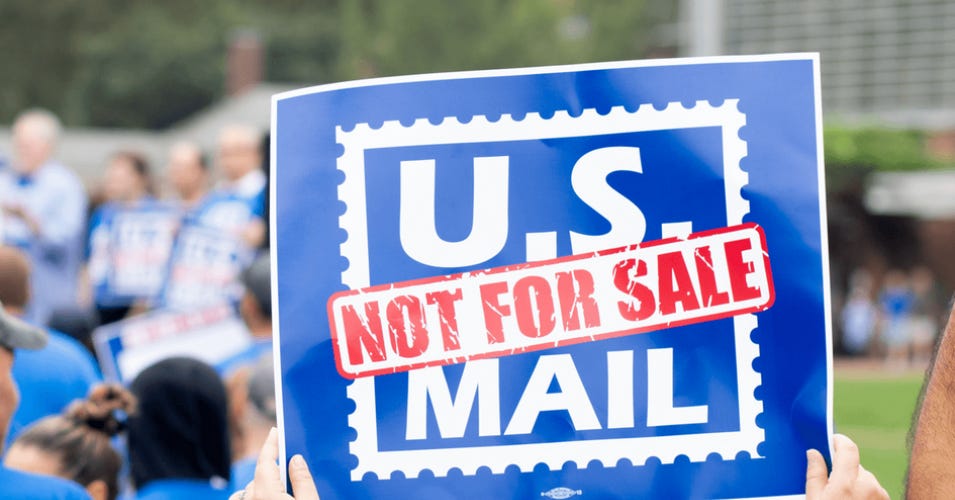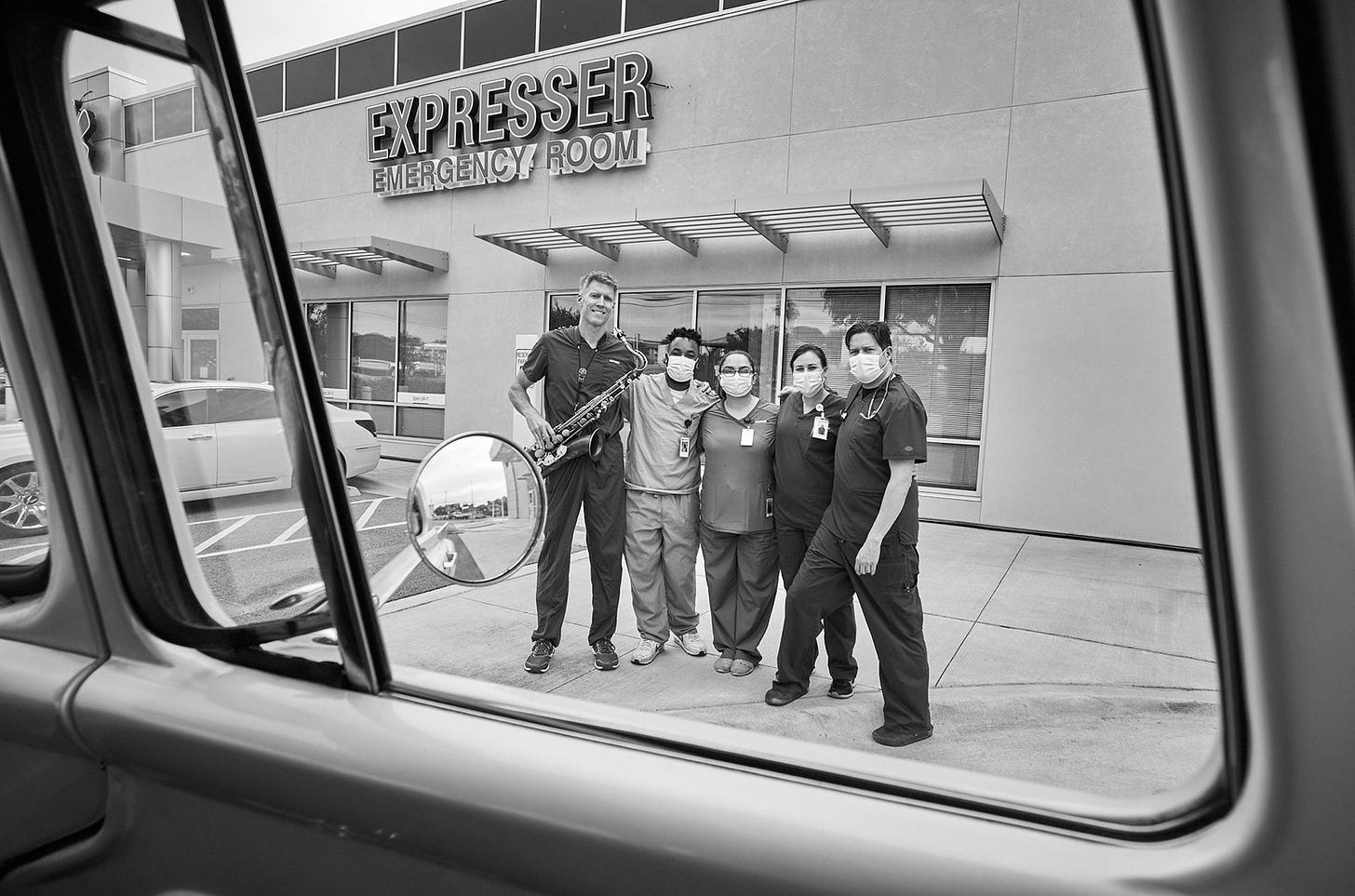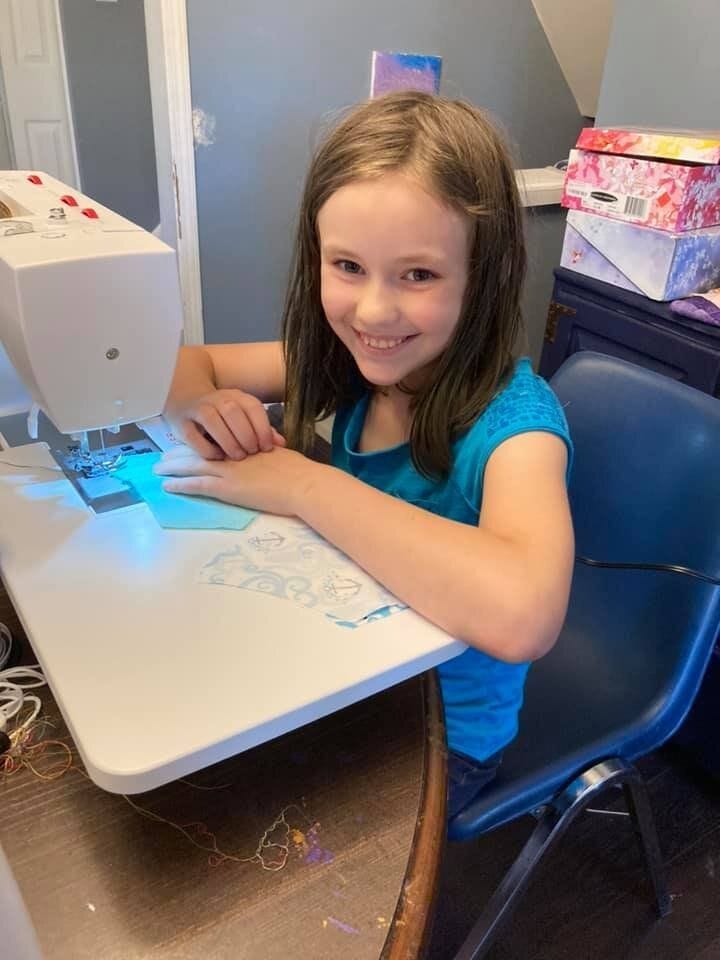The Weird Times
Issue 14: August 16, 2020
And will there be men to come who will remember
the Devil's legions had their votes, ward-workers, enthusiasts, willing
agents? And there came the amateurs of Hell, the volunteer demons
hungry for the look of fear their eyes would
feed upon, men devourd by hatred devouring hatred.
—Robert Duncan, TRIBUNALS, 1970

There’s a new crisis every day in Trump’s America. The firehose of outrages is designed to keep us off balance and pre-occupied. But the fight to save the vote is a big one. “Like a petty third-world potentate, Trump is willing to destroy a prized national asset in a pathetic attempt to cling to power. To help stop him, go to the grassroots alliance rallying to save our public post office — and our right to vote: USMailNotForSale.org/.”
Still, the story that is keeping me from sleeping is Kyle Murphy’s piece in Just Security, I Resigned from U.S. Government after my own leaders began acting like the autocrats I analyzed. Murphy was on Rachel Maddow August 13, and ruined my evening.
I left government service after more than a decade because I lost faith in the courage of the Secretary of Defense and the Chairman of the Joint Chiefs of Staff to refuse unlawful orders from the President.
It goes on from there. His advice, when pressed by Rachel to tell us what we as citizens can do, is that we need to participate, we need to make democracy work. I take this to mean more than voting, as so many will do. But I think we are coming to a time when we will need to put our own bodies into public spaces to defend democracy. As Murphy said, red light are flashing on our democracy now. Media and political leaders appear to be frozen, unable to move beyond their day-to-day reality. Maybe that is true for all of us. Shades of Germany, 1933. What an autocrat counts on is passivity and fear. We can’t allow ourselves to fall victim to either. No one will save us except ourselves.
+++
With the pandemic closing workspaces, the internet, Derek Thompson reports, “seems poised to weaken the spatial relationship between work and home.”
When the pandemic is over, one in six workers is projected to continue working from home or co-working at least two days a week, according to a recent survey by economists at Harvard Business School. Another survey of hiring managers by the global freelancing platform Upwork found that one-fifth of the workforce could be entirely remote after the pandemic.
What will that shift mean for the workforce—and society at large? Continue reading for three predictions from Derek. The Atlantic, August 6, 2020
+++
In a single season, civilization has been brought low by a microscopic parasite 10,000 times smaller than a grain of salt. COVID-19 attacks our physical bodies, but also the cultural foundations of our lives, the toolbox of community and connectivity that is for the human what claws and teeth represent to the tiger.
The Unraveling of America: Anthropologist Wade Davis on how COVID-19 signals the end of the American era, 8/6/20, Rolling Stone
+++
Bookstores and many other small retailers we know and love are going through difficult times. My friend Matt Tannenbaum, who owns and operates The Bookstore in Lenox, Massachusetts, supporting writers and enriching his community for decades, has just launched a GoFundMe campaign to keep the store from closing. Curbside pick up and mail order just don’t cut it for a business built on communal shopping. Browsing, talking about books, and being hand sold by a passionate bookseller are not replaced by anything else we know of. Whether you have ever been to Lenox, take my word for it, The Bookstore is a treasure worth saving. Donate here.
Please allow me to pontificate for a moment about capital and capital formation. Donating to a small business to keep it afloat is a temporary solution to a systemic problem, but is not a viable mechanism in the long run. Given the devastation to small business that we are witnessing, isn’t it time to start thinking about reviving communalism in the direct form of co-op ownership? Instead of donating to local bookstores and other businesses, why not create mechanisms for customers to buy ownership shares and make a commitment to be active customers and ambassadors for the store they are stakeholders in. Yes, it’s more work, and a much harder way to live your daily life, but it is clear that we have all been taken in by the false value of convenience over all else. It’s time to get back to building community brick-by-brick, day-by-day. Investing our money and labor in local businesses is a long-term commitment that will be rewarded in layered ways, not just in economic benefits but in social and human benefits as well.
Rethinking ownership will be a challenge to entrepreneurs as well as customers, but aren’t we in such a state of disruption that we must learn how to do things differently? Consumer and producer co-ops have been around for a long time. If you are excited by the notion of rebuilding our economy on a local level, consider connecting with people and organizations in your community, and start talking about co-ops and localism. Small is beautiful! Check out the Schumacher Center for a New Economics.

Health care workers outside of the emergency room in Austin, Texas
A Country in Quarantine: Photographs from a COVID Road Trip
Photographer Brian Bowen Smith, with the help of his camera and a vintage Ford pickup truck, offers a socially distanced glimpse of a country in turmoil. The photographs, which Smith shot through the window of his vintage Ford pickup truck, originated from a photo shoot with his family friend. “I drove into her driveway and photographed her,” Smith said. “When I showed my wife, she loved it and said I should continue to do more.”
BY SARAH SHOEN AND CHIARA MARINAI. PHOTOGRAPHY BY BRIAN BOWEN SMITH (Vanity Fair, July 1, 2020)
+++
In the face of climate change, grasslands also have a major role to play in sequestering carbon, storing as much as 180 tonnes of carbon per hectare, equivalent to the annual emissions of 39 cars. (A hectare is slightly smaller than a Canadian football field.)
Some estimate the uncultivated grasslands of Western Canada may store two to three billion tonnes of carbon.
Meet the people saving Canada’s grasslands, Stephanie Wood, The Narwhal
+++
Google, Facebook and Others Form Tech Coalition to Secure U.S. Election
Facebook, Google and other major tech companies said on Wednesday that they were forming a coalition to promote discussions with government agencies to secure the November election. (NYT)
In a joint statement released Wednesday, the companies, which also include Twitter, Reddit, Microsoft, Verizon, Pinterest, LinkedIn and Wikimedia Foundation, said they’re countering information operations on their platforms in the lead up to the 2020 Democratic National Convention and Republican National Convention. (CNET)
The statement came shortly after a meeting among the companies and government officials—the Cybersecurity and Infrastructure Security Agency, the FBI’s Foreign Influence Task Force, the Department of Justice’s National Security Division, and the Office of the Director of National Intelligence—to discuss the planning. It builds on a series of monthly meetings that go back to September of last year. (Politico)
The companies also said that their meeting agenda with the feds included “scenario planning related to election results,” adding, “We will continue to stay vigilant on these issues and meet regularly ahead of the November election.” (Mediaite)
The formation of the coalition is Big Tech’s first collective show of strength against interference in the U.S. 2020 election, yet it remains to be seen what sort of policy and moderation efforts will be put in place to combat misinformation on each platform. (Yahoo! Finance)
Hopeful? We’ll see. I think rather than waiting for institutions, even big tech, to save us, we need to organize ourselves. To get the vote out, to protect the vote, to stand up after the vote. Democracy requires an active citizenry. Let’s act up now!
+++
The Weird Times can be dark and foreboding, but we are also in a period of incredible creativity and unleashing genius on our problems and challenges. Here are some stories of hope and optimism:
As the world awaits vaccines to bring the COVID-19 pandemic under control, UC San Francisco scientists have devised a novel approach to halting the spread of SARS-CoV-2, the virus that causes the disease. Led by UCSF graduate student Michael Schoof, a team of researchers engineered a completely synthetic, production-ready molecule that straitjackets the crucial SARS-CoV-2 machinery that allows the virus to infect our cells. As reported in a new paper, now available on the preprint server bioRxiv, experiments using live virus show that the molecule is among the most potent SARS-CoV-2 antivirals yet discovered. In an aerosol formulation they tested, dubbed "AeroNabs" by the researchers, these molecules could be self-administered with a nasal spray or inhaler. Used once a day, AeroNabs could provide powerful, reliable protection against SARS-CoV-2 until a vaccine becomes available. (via Science Daily)
The large number of people already infected with the coronavirus in the US has begun to act as a brake on the spread of the disease in hard-hit states. Millions of US residents have been infected by the virus that causes covid-19, and at least 160,000 are dead. One effect is that the pool of susceptible individuals has been depleted in many areas. After infection, it’s believed, people become immune (at least for months), so they don’t transmit the virus to others. This slows the pandemic down. The exact extent to which acquired immunity is slowing the rate of transmission is unknown, but major questions like school reopening and air travel may eventually hinge on the answer. (via MIT Technology Review)
Meet Raina Jain, a 17-year-old student who recently graduated from Greenwich High School and is headed to the University of Connecticut in just a few weeks. This past year she worked on a science project that has the potential to solve one of the world’s large-scale problems. She has designed an entranceway for beehives that can stop a varroa mite infestation in its tracks. A 17-year-old from Connecticut is Saving Honey Bees, Kevin Anderton, Forbes.com, August 11, 2020.
Nine-year-old Michaela Munyan in Oakland Township, Mich., has sewn more than 500 masks during the pandemic and gave them all away – to nurses, a local home health agency, the pastors at her church, and even the deliverymen at her favorite pizza place:

Photo Courtesy of the Munyan Family
“In March, after the coronavirus forced her school to close, she overheard her mom and dad … talking about the shortage of personal protective equipment at a hospital. ‘I think I can make a mask,’ Michaela offered, and after her mom helped find a pattern online, she got to work. She hasn’t stopped. … Michaela’s hairless cat, Minerva, provides quality control and can often be found perched on top of Michaela’s sewing machine while she works,” Scott Allen reports. “As the number of reported coronavirus cases in Michigan approached 70,000 last week, Michaela received a much-anticipated package in the mail. The new sewing machine she ordered more than a month ago using birthday money … finally arrived, allowing her to retire the temperamental old model that [her mom] received from her own grandmother as a teenager. She has already put it to good use. ‘It’s way, way quieter and easier to thread,’ Michaela said.”
It sounds trite, but it's true: There is nothing wrong with America that cannot be fixed by what is right with America.
+++
Charles Alexander
III. China
On Leaving
only a word go
or a wind blow
or a mind no
or a mend sew
make amends flow
speak amens fly
hallelujah away
from Pushing Water 3 / Truro Shift, to be published by Cuneiform Press in 2021.
+++
If I had it my way, everything would change
Out here on this highway the rules are still the same
Back roads never carry you where you want 'em to
They leave you standin' there with them ol' transcendental blues
Steve Earle, Transcendental Blues
+++
The Weird Times has a bookstore! Visit my Bookshop.org reading shelf and buy books from Bookshop as an alternative to Amazon.




This is a particularly thoughtful Weird Times. Keep up the excellent work